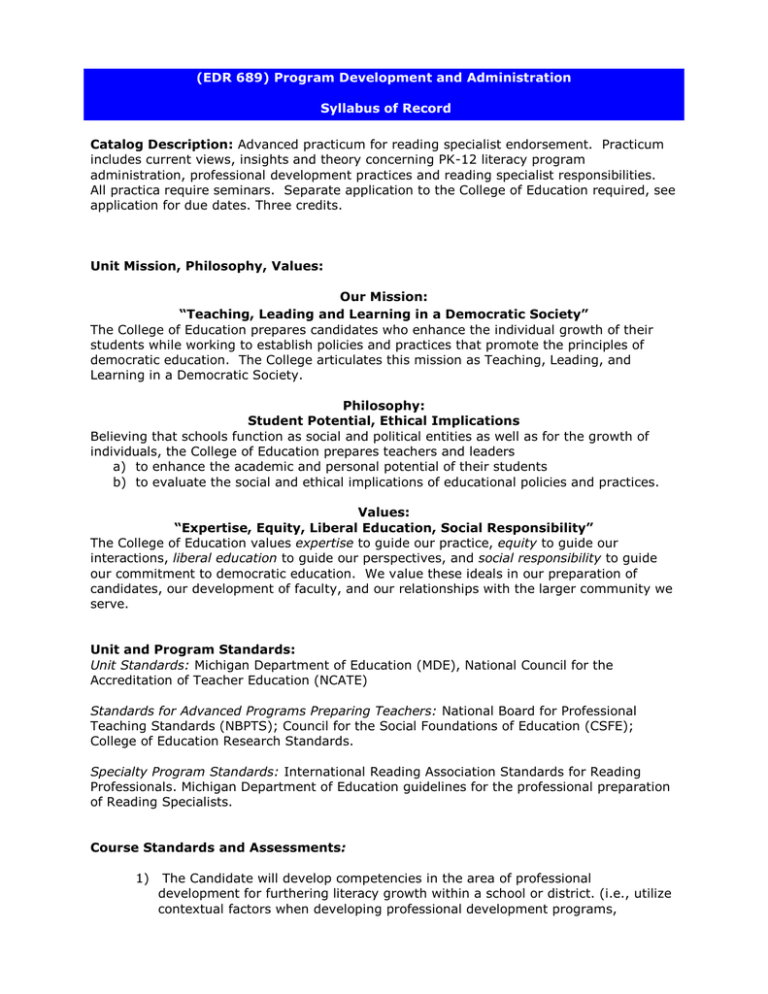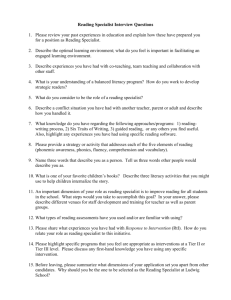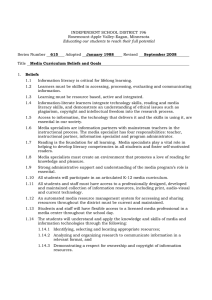(EDR 689) Program Development and Administration Syllabus of Record Catalog Description:
advertisement

(EDR 689) Program Development and Administration Syllabus of Record Catalog Description: Advanced practicum for reading specialist endorsement. Practicum includes current views, insights and theory concerning PK-12 literacy program administration, professional development practices and reading specialist responsibilities. All practica require seminars. Separate application to the College of Education required, see application for due dates. Three credits. Unit Mission, Philosophy, Values: Our Mission: “Teaching, Leading and Learning in a Democratic Society” The College of Education prepares candidates who enhance the individual growth of their students while working to establish policies and practices that promote the principles of democratic education. The College articulates this mission as Teaching, Leading, and Learning in a Democratic Society. Philosophy: Student Potential, Ethical Implications Believing that schools function as social and political entities as well as for the growth of individuals, the College of Education prepares teachers and leaders a) to enhance the academic and personal potential of their students b) to evaluate the social and ethical implications of educational policies and practices. Values: “Expertise, Equity, Liberal Education, Social Responsibility” The College of Education values expertise to guide our practice, equity to guide our interactions, liberal education to guide our perspectives, and social responsibility to guide our commitment to democratic education. We value these ideals in our preparation of candidates, our development of faculty, and our relationships with the larger community we serve. Unit and Program Standards: Unit Standards: Michigan Department of Education (MDE), National Council for the Accreditation of Teacher Education (NCATE) Standards for Advanced Programs Preparing Teachers: National Board for Professional Teaching Standards (NBPTS); Council for the Social Foundations of Education (CSFE); College of Education Research Standards. Specialty Program Standards: International Reading Association Standards for Reading Professionals. Michigan Department of Education guidelines for the professional preparation of Reading Specialists. Course Standards and Assessments: 1) The Candidate will develop competencies in the area of professional development for furthering literacy growth within a school or district. (i.e., utilize contextual factors when developing professional development programs, articulate, plan, implement and evaluate professional development programs, actively engage in curriculum development, supervision, coordination, and support services associated with literacy.) (IRA: 3.3, 5.4) 2) The Candidate will learn about and complete activities connected to the role of reading specialist as a leader and continual learner (i.e., understands and applies research to professional work; understands literacy issues; and engages in professional literacy organizations). (IRA 5.2) 3) The Candidate will develop techniques for working with groups beyond the classroom and school to further promote literacy development in the broader community (i.e., communicate with parents, teachers, administrators, literacy professionals, the public). (IRA: 5.1) Common Course Assessment: 1) K-12 Professional Development Program Project 2) Literacy Leadership Project 3) Community Involvement Project Major Topics: Working with standardized school/state assessment data Creating effective surveys School literacy program assessment Professional development approaches Evaluating professional development programs Working with the broader community School / family partnerships Learning about grant writing Creating school change Course Knowledge Base: Allington, R. L., & Walmsley, S. A. No quick fix: Rethinking literacy programs in America’s elementary schools. American Federation of Teachers. Teaching reading is rocket science: What expert teachers of reading should know and be able to do. Barclay, K. D., & Thistlewaite, L. Reading specialists of the 90’s: Who are they and what do they want? Bean, R. (and colleagues). a) Improving graduate teacher education in reading: Implications from the work of the Commission on the Role of the Reading Specialist. b) In class or pullout: Effects of setting on the remedial reading program. c) Changing the role of the reading specialist: From pull-out to in-class programs. d) Learning from each other: Collaboration between classroom teachers and reading specialist interns. e) Focus on Chapter 1 reading programs: Views of reading specialists, classroom teachers, and principals. f) Reading specialists in exemplary schools. Eltink, M. A. Concerns of practicing reading specialists. Hamilton, R. Chapter 1 reading instruction: Exemplary reading specialists in an in-class model. Henk, W. A., et al. A reading lesson observational framework for elementary teachers, principals, and literacy supervisors. Henwood, G. F. A new role for the reading specialist: Contributing toward a high school’s collaborative educational culture. International Reading Association. a) Excellent reading teachers: A position statement of the International Reading Association b) Standards for reading professionals – Revised. c) Teaching all children to read: The roles of the reading specialist. A position statement of the International Reading Association. d) Preparing reading professionals: A collection from the International Reading Association. Jaeger, E. L. The reading specialist as collaborative consultant. Klein, J., et al. A. Reading/language arts programs and personnel in Connecticut schools: Summary Report. Kletzien, S. B. Reading programs in nationally recognized elementary schools. Loucks-Horsley, S., et al. Continuing to learn: A guidebook for teacher development. Long, R. Preserving the role of the reading specialist. Orlich, D.C. Staff development: Enhancing human potential. Quatroche, D. J., et al. The role of the reading specialist: A review of research. Radencich, M. C., et al. A Handbook for the K-12 Reading Resource Specialist. Reinken, B. J., & King, C. M. Rethinking the language arts: A framework for school wide professional practice. Silberman, M. Active learning: 101 strategies to teach any subject. Tancock, S. Classroom teachers and reading specialists examine their Chapter 1 reading programs. Toll, C. A. The literacy coach’s survival guide: Essential questions and practical answers. Tucker, P. D., & Stronge, J. H. Linking teacher evaluation and student learning. Wepner, S. B., et al. Positioning deans and directors for the twenty-first century: Phase II. Zmuda, A., et al. Transforming schools: Creating a culture of continuous improvement.



